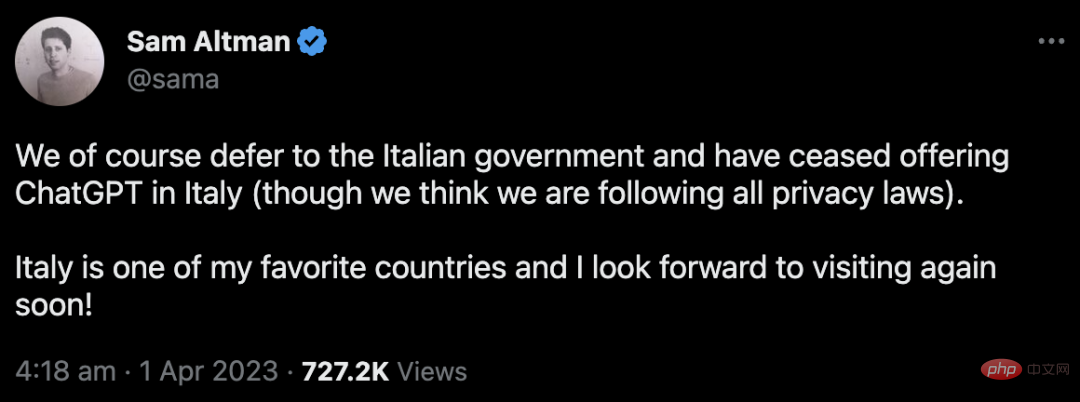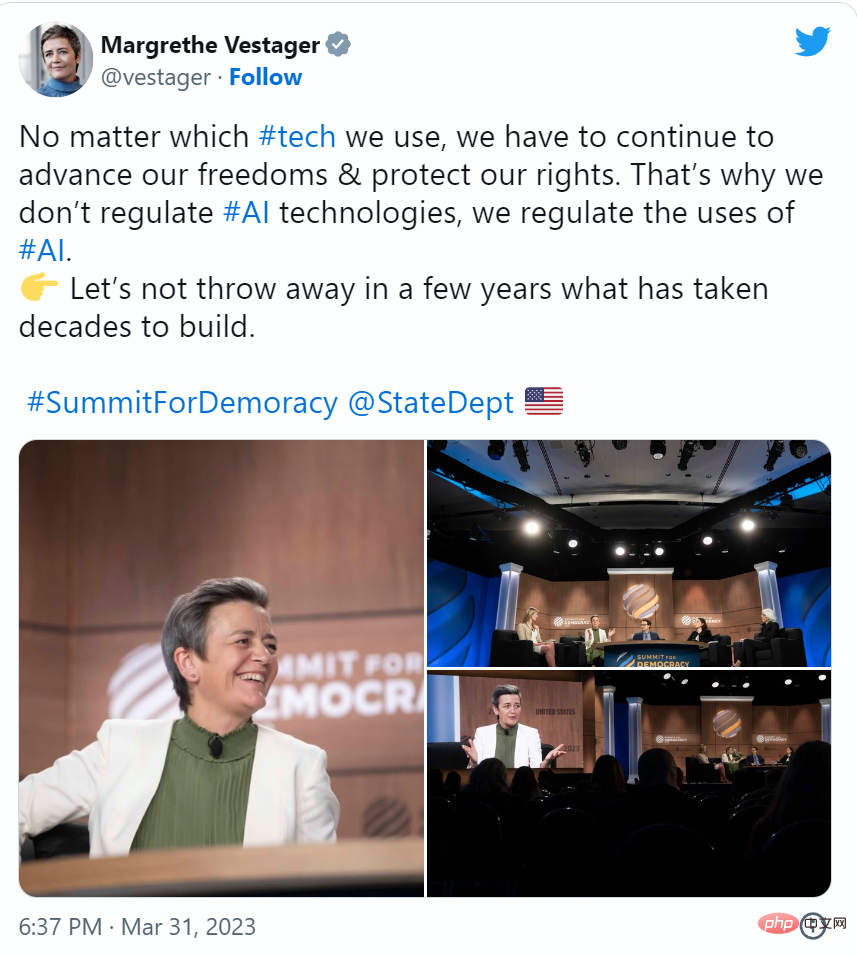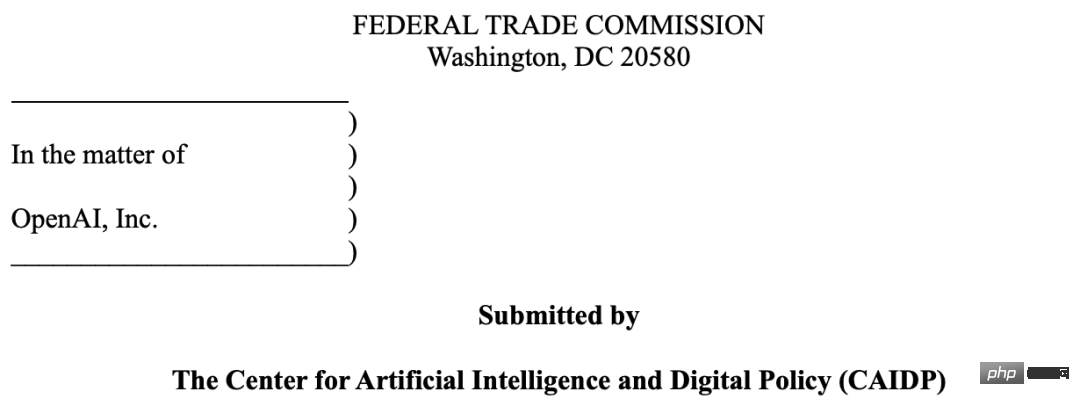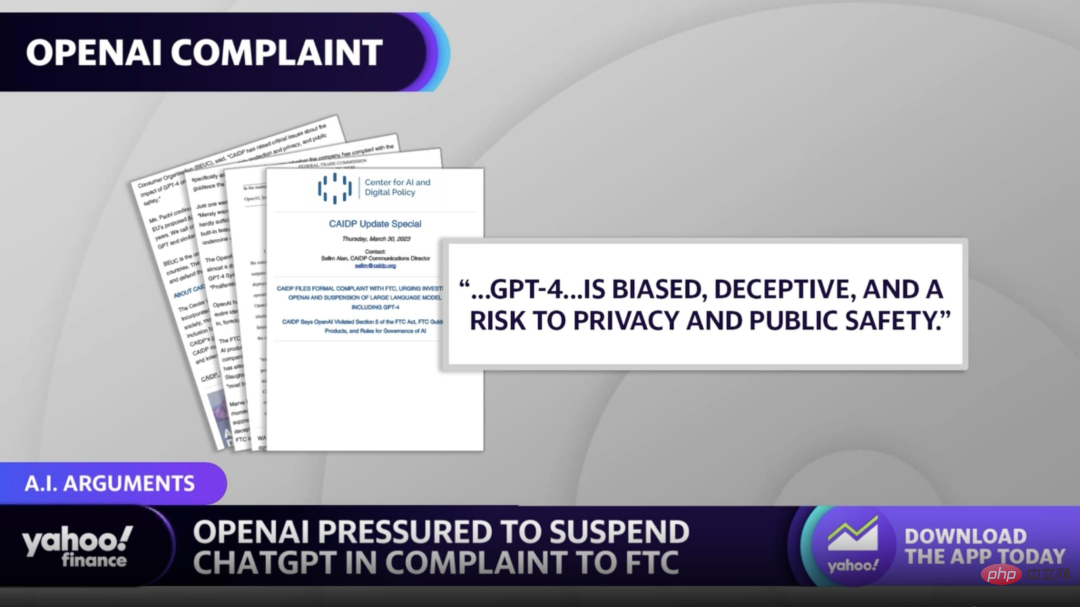 Technology peripherals
Technology peripherals
 AI
AI
 Italy becomes the first country to ban ChatGPT! OpenAI CEO: I don't think there's any violation
Italy becomes the first country to ban ChatGPT! OpenAI CEO: I don't think there's any violation
Italy becomes the first country to ban ChatGPT! OpenAI CEO: I don't think there's any violation
Just yesterday, the Italian government suddenly ordered to ban ChatGPT!
Soon, OpenAI CEO Sam Altman responded that the company had shut down the local ChatGPT service (but it believed that it had not violated any regulations).

Since then, Italy has become the first country in the world to announce the ban on ChatGPT.
(ChatGPT cannot be used in other countries and regions because OpenAI did not open it from the beginning.)
Italy bans ChatGPT and fully investigates privacy issues
On March 31, Italy’s national privacy regulator officially ordered the ban of ChatGPT and accused OpenAI of “illegal collection of personal data.”
It is worth noting that this “temporary ban” will remain in effect until OpenAI can respect the European Union’s landmark privacy law, the General Data Protection Regulation (GDPR).

File address: https://www.garanteprivacy.it/home/docweb/-/docweb-display/docweb/9870847 #english
According to a press release issued by the Italian national data protection agency GPDP, OpenAI’s behavior of collecting user data and using it for algorithm “training” lacks legal basis.
At the same time, the leakage of user conversation and payment information on March 20 also clearly exposed OpenAI’s problems with the processing of personal information.
In addition, although OpenAI claims that ChatGPT is aimed at users over 13 years old, due to the lack of corresponding age verification mechanism, minors are likely to see content beyond their age. Information about one’s own development and level of self-awareness.
The regulatory agency stated that OpenAI has 20 days. If it does not provide feasible remedial measures, it will face a fine of up to 20 million euros, or 4% of the total global annual turnover. .
In response, OpenAI stated that it has now closed the service for Italian users and promised to protect the privacy of users:
"We are When training systems like ChatGPT, we have been working hard to reduce personal data, because we want this AI to understand the world, not individuals. Of course, we also believe that AI supervision is necessary."
It seems that the future fate of ChatGPT in Italy may depend on these 20 days.
However, this is not the first time for Italy to take such action against AI chatbots.
In February, regulators banned chatbot app Replika.ai. Replika was "notorious" for the intimate relationships some users formed with robots. Later, Replika removed the option for pornographic role-playing, and some users even required help from a suicide hotline.
Should AI tools be restricted?
After the release of ChatGPT, although the ability to write papers and code is dazzling, its spread of misinformation, impact on employment, and broader risks to the entire human society have all made people dazzled. Many people are worried and issuing warnings.
Recently, there have been waves of bans on GPT technology.
Not only Turing Award winner Yoshua Bengio, Musk, Marcus and other thousands of big guys signed an open letter, calling on all AI laboratories around the world to suspend training on machines more powerful than GPT-4 AI model.
Moreover, the consumer rights protection organization BEUC has also recently called on the EU and national authorities to investigate ChatGPT.
In addition, many experts have also stated that new regulations are needed to manage AI due to its potential impact on national security, employment, and education.
A spokesman for the European Commission said: "We hope that all companies active in the EU will respect the EU's data protection rules. Enforcing the General Data Protection Regulation is the responsibility of the EU data protection authorities."
European Commission Executive Vice President Margrethe Vestager said on Twitter that the Commission, which is discussing the EU Artificial Intelligence Bill, may not be inclined to ban artificial intelligence.
"No matter which technology we use, we must protect our own rights. This is why we do not regulate AI technology, but regulate the use of AI."

In the United States, the non-profit organization Center for Artificial Intelligence and Digital Policy (CAIDP) also asked the Federal Trade Commission (FTC) to investigate whether OpenAI violated consumer protection rules and ban it It further released GPT-4.
After all, with the precedent of a joint letter from thousands of big bosses, CAIDP’s appeal seems more logical. Moreover, CAIDP Chairman Marc Rotenberg surprisingly signed the letter.

File address: https://cdn.arstechnica.net/wp-content/uploads/2023/03/CAIDP-FTC -Complaint-OpenAI-GPT-033023.pdf
Overall, the content of the CAIDP complaint is consistent with that letter, calling for slowing down the development of generative AI models. , and implement stricter government oversight.
However, CAIDP further believes that ChatGPT is "biased, deceptive, and poses a risk to public safety."
Although OpenAI has publicly pointed out the potential threats of AI-generated text, CAIDP believes that GPT-4 has gone far beyond the line and regulatory action should be taken to protect consumers.
CAIDP stated that the GPT-4 model has many major potential threats, such as the way GPT-4 can generate malicious code and highly customized propaganda, and its biased training data, This can lead to stereotypes or unfair racial and gender preferences in areas such as recruitment.
CAIDP believes that OpenAI’s actions violate Section 5 of the FTC Act, which prohibits unfair and deceptive trade practices.
Among them, the illusion of the AI model and the nonsense are all deception in the view of CAIDP. It warned ChatGPT of "promoting deceptive business statements and advertising," which could fall under the FTC's purview.

In the complaint, CAIDP asked the FTC to halt all further commercial deployments of the GPT model and to require that the model be reviewed before any future rollout. Conduct an independent evaluation. It also calls for a publicly accessible reporting tool, similar to the one that allows consumers to file fraud complaints.
CAIDP looks for signs that big tech companies are trying to monopolize competition, and the investigation into OpenAI, one of the major players in the AI arms race, marks a major step forward in the investigation, said CAIDP chairperson Lina Khan. upgrade.
Some analysts believe that although CAIDP’s complaint will not cause the FTC to take action in the short term, relevant supervision is likely to occur in the future, and may allow GPT-5 to Release postponed.
Finally, I can only say that the "reputational risk" that Google has been worried about has finally arrived.
Reference:
https: //www.php.cn/link/d35a29602005cb55aa57a5f683c8e0c2
The above is the detailed content of Italy becomes the first country to ban ChatGPT! OpenAI CEO: I don't think there's any violation. For more information, please follow other related articles on the PHP Chinese website!

Hot AI Tools

Undresser.AI Undress
AI-powered app for creating realistic nude photos

AI Clothes Remover
Online AI tool for removing clothes from photos.

Undress AI Tool
Undress images for free

Clothoff.io
AI clothes remover

AI Hentai Generator
Generate AI Hentai for free.

Hot Article

Hot Tools

Notepad++7.3.1
Easy-to-use and free code editor

SublimeText3 Chinese version
Chinese version, very easy to use

Zend Studio 13.0.1
Powerful PHP integrated development environment

Dreamweaver CS6
Visual web development tools

SublimeText3 Mac version
God-level code editing software (SublimeText3)

Hot Topics
 1377
1377
 52
52
 ChatGPT now allows free users to generate images by using DALL-E 3 with a daily limit
Aug 09, 2024 pm 09:37 PM
ChatGPT now allows free users to generate images by using DALL-E 3 with a daily limit
Aug 09, 2024 pm 09:37 PM
DALL-E 3 was officially introduced in September of 2023 as a vastly improved model than its predecessor. It is considered one of the best AI image generators to date, capable of creating images with intricate detail. However, at launch, it was exclus
 Choosing the embedding model that best fits your data: A comparison test of OpenAI and open source multi-language embeddings
Feb 26, 2024 pm 06:10 PM
Choosing the embedding model that best fits your data: A comparison test of OpenAI and open source multi-language embeddings
Feb 26, 2024 pm 06:10 PM
OpenAI recently announced the launch of their latest generation embedding model embeddingv3, which they claim is the most performant embedding model with higher multi-language performance. This batch of models is divided into two types: the smaller text-embeddings-3-small and the more powerful and larger text-embeddings-3-large. Little information is disclosed about how these models are designed and trained, and the models are only accessible through paid APIs. So there have been many open source embedding models. But how do these open source models compare with the OpenAI closed source model? This article will empirically compare the performance of these new models with open source models. We plan to create a data
 A new programming paradigm, when Spring Boot meets OpenAI
Feb 01, 2024 pm 09:18 PM
A new programming paradigm, when Spring Boot meets OpenAI
Feb 01, 2024 pm 09:18 PM
In 2023, AI technology has become a hot topic and has a huge impact on various industries, especially in the programming field. People are increasingly aware of the importance of AI technology, and the Spring community is no exception. With the continuous advancement of GenAI (General Artificial Intelligence) technology, it has become crucial and urgent to simplify the creation of applications with AI functions. Against this background, "SpringAI" emerged, aiming to simplify the process of developing AI functional applications, making it simple and intuitive and avoiding unnecessary complexity. Through "SpringAI", developers can more easily build applications with AI functions, making them easier to use and operate.
 How to install chatgpt on mobile phone
Mar 05, 2024 pm 02:31 PM
How to install chatgpt on mobile phone
Mar 05, 2024 pm 02:31 PM
Installation steps: 1. Download the ChatGTP software from the ChatGTP official website or mobile store; 2. After opening it, in the settings interface, select the language as Chinese; 3. In the game interface, select human-machine game and set the Chinese spectrum; 4 . After starting, enter commands in the chat window to interact with the software.
 Posthumous work of the OpenAI Super Alignment Team: Two large models play a game, and the output becomes more understandable
Jul 19, 2024 am 01:29 AM
Posthumous work of the OpenAI Super Alignment Team: Two large models play a game, and the output becomes more understandable
Jul 19, 2024 am 01:29 AM
If the answer given by the AI model is incomprehensible at all, would you dare to use it? As machine learning systems are used in more important areas, it becomes increasingly important to demonstrate why we can trust their output, and when not to trust them. One possible way to gain trust in the output of a complex system is to require the system to produce an interpretation of its output that is readable to a human or another trusted system, that is, fully understandable to the point that any possible errors can be found. For example, to build trust in the judicial system, we require courts to provide clear and readable written opinions that explain and support their decisions. For large language models, we can also adopt a similar approach. However, when taking this approach, ensure that the language model generates
 Rust-based Zed editor has been open sourced, with built-in support for OpenAI and GitHub Copilot
Feb 01, 2024 pm 02:51 PM
Rust-based Zed editor has been open sourced, with built-in support for OpenAI and GitHub Copilot
Feb 01, 2024 pm 02:51 PM
Author丨Compiled by TimAnderson丨Produced by Noah|51CTO Technology Stack (WeChat ID: blog51cto) The Zed editor project is still in the pre-release stage and has been open sourced under AGPL, GPL and Apache licenses. The editor features high performance and multiple AI-assisted options, but is currently only available on the Mac platform. Nathan Sobo explained in a post that in the Zed project's code base on GitHub, the editor part is licensed under the GPL, the server-side components are licensed under the AGPL, and the GPUI (GPU Accelerated User) The interface) part adopts the Apache2.0 license. GPUI is a product developed by the Zed team
 Don't wait for OpenAI, wait for Open-Sora to be fully open source
Mar 18, 2024 pm 08:40 PM
Don't wait for OpenAI, wait for Open-Sora to be fully open source
Mar 18, 2024 pm 08:40 PM
Not long ago, OpenAISora quickly became popular with its amazing video generation effects. It stood out among the crowd of literary video models and became the focus of global attention. Following the launch of the Sora training inference reproduction process with a 46% cost reduction 2 weeks ago, the Colossal-AI team has fully open sourced the world's first Sora-like architecture video generation model "Open-Sora1.0", covering the entire training process, including data processing, all training details and model weights, and join hands with global AI enthusiasts to promote a new era of video creation. For a sneak peek, let’s take a look at a video of a bustling city generated by the “Open-Sora1.0” model released by the Colossal-AI team. Open-Sora1.0
 Microsoft, OpenAI plan to invest $100 million in humanoid robots! Netizens are calling Musk
Feb 01, 2024 am 11:18 AM
Microsoft, OpenAI plan to invest $100 million in humanoid robots! Netizens are calling Musk
Feb 01, 2024 am 11:18 AM
Microsoft and OpenAI were revealed to be investing large sums of money into a humanoid robot startup at the beginning of the year. Among them, Microsoft plans to invest US$95 million, and OpenAI will invest US$5 million. According to Bloomberg, the company is expected to raise a total of US$500 million in this round, and its pre-money valuation may reach US$1.9 billion. What attracts them? Let’s take a look at this company’s robotics achievements first. This robot is all silver and black, and its appearance resembles the image of a robot in a Hollywood science fiction blockbuster: Now, he is putting a coffee capsule into the coffee machine: If it is not placed correctly, it will adjust itself without any human remote control: However, After a while, a cup of coffee can be taken away and enjoyed: Do you have any family members who have recognized it? Yes, this robot was created some time ago.



